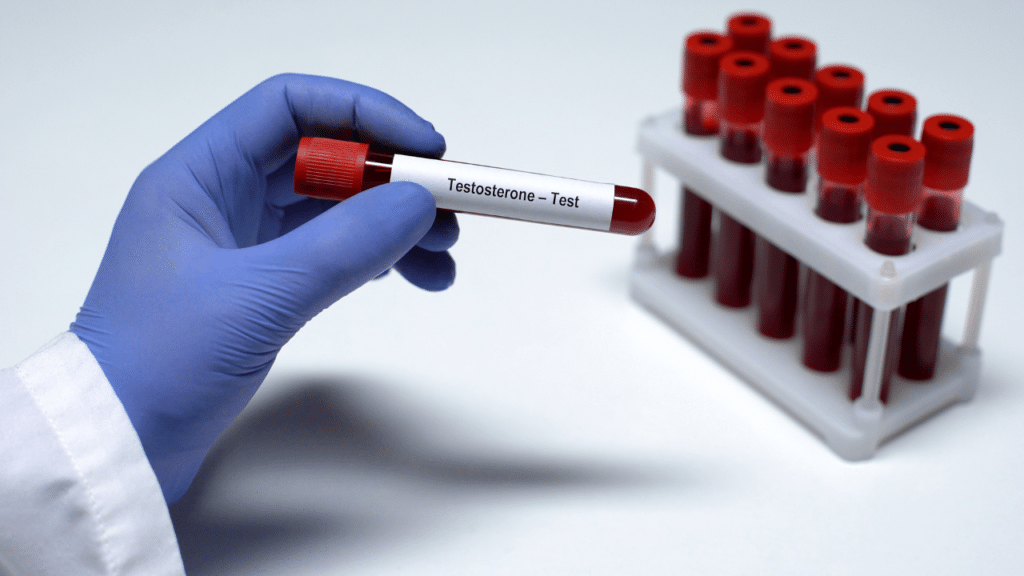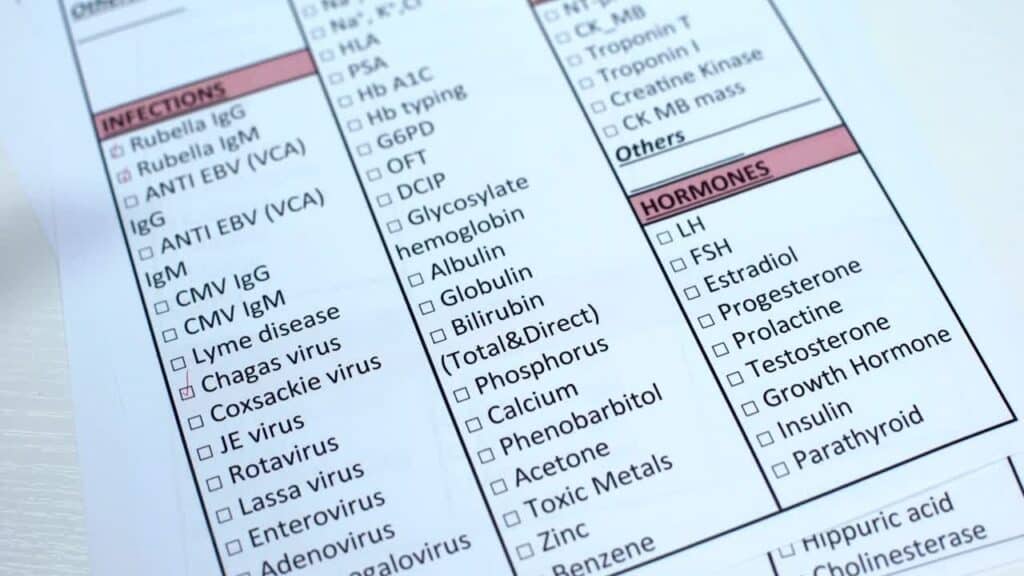Many people wonder about the significance of a testosterone blood test and why it might be recommended for them. This curiosity often stems from conversations with healthcare providers or personal health assessments. The testosterone in the body plays a crucial role not just in sexual development and function but also in maintaining muscle mass and overall well-being. Given its importance, understanding and monitoring the levels of testosterone in the body can provide valuable insights into one’s health status.
For individuals experiencing symptoms like irregular menstrual cycles, problems with the testicles, or unexpected changes in physical appearance, such as abnormal hair growth or male-pattern baldness, a testosterone blood test becomes particularly relevant. This test measures the total amount of testosterone, including what is bound to proteins and what floats freely in the blood, offering a comprehensive view of testosterone in your blood. Recognizing the need for such a test and opting to take it is a proactive step toward managing health effectively.

Introduction to Testosterone Blood Tests
At its core, a testosterone blood test is an extremely valuable tool for diagnosing certain medical conditions by measuring the levels of testosterone in your body. This hormone, critical for both men and women, influences a wide range of bodily functions, from mood to muscle mass. Healthcare professionals can identify underlying health issues by evaluating these levels, enabling timely intervention and management. It is a fundamental step towards understanding one’s hormonal health and addressing any concerns that arise from its imbalance.
Understanding What Testosterone Tests Measure
Testosterone tests are designed to evaluate the presence of the hormone testosterone and its availability in your system. Specifically, a total testosterone test measures not only the free hormone but also the portion that is attached to proteins in the blood. This is significant because it affects the hormone’s ability to function. The test can help identify issues like irregular periods by providing insights into the hormonal imbalances that might be causing these disturbances, offering a clearer picture of an individual’s reproductive and general health.
The Importance of Monitoring Testosterone Levels
Keeping an eye on testosterone levels is crucial for several reasons. Testosterone bound to proteins, or SHBG levels, can influence the body’s overall hormonal balance and impact various functions, including blood sugar regulation. Monitoring these levels can help detect early signs of health issues, allowing for prompt and appropriate treatment. It also aids in understanding how certain conditions or lifestyle factors might be affecting one’s hormonal health, underscoring the importance of regular health assessments.
Who Needs a Testosterone Blood Test and When?
Testosterone blood tests are beneficial for both males and females who exhibit symptoms of abnormal testosterone levels, such as irregular menstrual periods, problems with the testicles, or signs like abnormal hair growth, male-pattern baldness, or changes in sexual function. Additionally, these tests can offer insights into health issues related to weak bones, trouble concentrating, and changes in body hair growth. Test kits for checking levels through blood or saliva are available, making it easier for individuals to take the first step toward assessing their hormonal health at their convenience.
“Low testosterone affects 13 million men in the United States.”
WMURO.com

Preparing for Your Testosterone Test
Both men and women considering a testosterone test should be aware of how conditions like male-pattern baldness and kidney disease might influence their hormone levels and, thus, the test’s outcomes. Preparing for the test involves understanding and discussing these factors with a healthcare provider to ensure accurate results.
How to Prepare for the Test
Preparing for testosterone blood tests involves simple steps to ensure the accuracy of hormone levels measured. It’s important to inform your healthcare provider about any medications or supplements you’re taking, as these can influence hormone levels.
Pros
Undergoing a testosterone blood test has several advantages. It provides vital information about one’s hormonal health, aiding in diagnosing medical conditions. Early detection through these tests can lead to timely treatment, potentially preventing more serious health issues. Additionally, it can help individuals understand changes in their bodies and guide decisions regarding lifestyle modifications or treatments.
Cons
Despite the benefits, there are some downsides to consider. The accuracy of testosterone blood tests can sometimes be affected by various factors, including certain medications or the time of day the test is taken. Additionally, for some, the process of drawing blood might cause discomfort or anxiety. Understanding these cons helps set realistic expectations for those considering the test.
What to Expect During the Testosterone Blood Test
When undergoing a testosterone blood test, individuals can expect a simple and quick procedure. Healthcare professionasl will collect a blood sample, typically from a vein in the arm, which might cause a slight sting or sting when the needle is inserted. This process is crucial for diagnosing certain medical conditions and usually takes just a few minutes, with minimal discomfort reported by most patients.
Understanding the Risks Associated with Testosterone Testing
While testosterone blood testing is generally safe, it’s essential to be aware of potential risks, albeit minor. These include slight bruising or pain at the needle insertion site. In rare cases, more significant complications like excessive bleeding or infection can occur. However, these risks are relatively uncommon, making testosterone testing a low-risk procedure for most people.

Interpreting Your Testosterone Test Results
Understanding your testosterone test results involves comparing your levels to established reference ranges, which consider factors like age and sex. Abnormal levels might indicate issues with the adrenal glands, benign tumors, or other health conditions. Recognizing these signs and symptoms is crucial for further diagnosis and treatment.
Deciphering Normal vs. Abnormal Testosterone Levels
Testosterone levels vary significantly among individuals, affected by factors such as age, sex, and overall health. Normal ranges consider testosterone bound to proteins and SHBG levels, as well as blood sugar levels and their impact on hormonal health. Conditions like delayed puberty or hormonal imbalances can be identified through deviations from these norms, guiding further medical evaluation.
What is Normal Testosterone for a Man or Person AMAB?
For men and persons assigned male at birth (AMAB), testosterone levels decrease naturally with age. Understanding this gradual change is essential for interpreting test results accurately. Recognizing what is considered normal for one’s age group helps in evaluating whether observed levels indicate a health concern needing further investigation or are part of the natural aging process.
Symptoms of Low Testosterone and Next Steps
Low testosterone levels in males can manifest through various symptoms, including reduced sexual function and body hair growth. Identifying these signs is crucial for early intervention. Following a diagnosis, treatment options might include lifestyle changes or hormone therapy tailored to the individual’s specific needs and health objectives, emphasizing the importance of a personalized approach to healthcare.
How Often Should You Check Your Testosterone Levels?
Checking your testosterone levels depends on several factors, like if you are experiencing symptoms of low testosterone or if you have had abnormal results in the past. Generally, if you’re experiencing symptoms such as fatigue, decreased muscle mass, or low libido, it’s a good idea to get tested. After the initial test, your doctor might suggest a follow-up test in a few months to monitor changes. For those with normal levels and no symptoms, checking every few years may be sufficient. It’s best to follow your healthcare provider’s advice based on your health status.

Additional Considerations and FAQs
Blood tests for testosterone can offer insight into fertility problems and symptoms of high testosterone. These tests help in understanding the underlying causes and guiding treatment options. Whether you’re experiencing unexpected changes in mood, energy levels, or physical appearance, discussing these symptoms with a healthcare provider can help determine if a testosterone test is necessary for you. Remember, each individual’s situation is unique, and your healthcare provider can offer the most personalized advice.
The Role of Lifestyle in Testosterone Levels
Lifestyle factors can significantly impact testosterone levels, including diet, exercise, stress, and sleep quality. For instance, maintaining a healthy weight and making sure you have regular physical activity are known to help optimize testosterone levels. Additionally, managing stress through mindfulness or therapy and ensuring sufficient sleep can positively affect SHBG levels, which in turn influences the availability of testosterone in the body. Making informed lifestyle choices can support healthy testosterone levels and overall well-being.
Privacy and Confidentiality of Test Results
When it comes to testosterone testing, ensuring the privacy and confidentiality of your test results is paramount. Healthcare providers are bound by confidentiality laws, meaning your results are shared with no one but you and any other healthcare professionals you’ve authorized. Tests for conditions like Klinefelter syndrome or precocious puberty require sensitivity and discretion, and your healthcare provider is committed to diagnosing any health concerns with the utmost confidentiality.
Test Costs and Lab Locations
The cost of testosterone tests and the availability of lab locations can vary widely. Typically, both men and women can expect to find testing options at local labs or through their healthcare providers. It’s important to consider that some insurance plans may cover the cost of these tests, especially if they’re deemed medically necessary due to symptoms or conditions like kidney disease. Checking with your insurance provider and comparing lab locations for the best rates and convenience is advisable.

Why Choose a Total Testosterone Test
A total testosterone test is comprehensive, measuring all three forms of testosterone in the blood: free, SHBG-bound, and albumin-bound. This test offers a complete picture of an individual’s testosterone levels, making it a critical tool for diagnosing conditions like male hypogonadism, decreased muscle mass, or hormonal imbalances in both men and women. Choosing a total testosterone test ensures a thorough evaluation, which is crucial for guiding treatment options and monitoring conditions related to testosterone levels.
The Accuracy and Reliability of Total Testosterone Tests
Total testosterone tests are highly accurate and reliable for assessing the levels of this crucial hormone in the body. They measure the combined amount of free testosterone, directly available to cells, and testosterone bound to proteins like SHBG and albumin. This comprehensive approach ensures a more accurate assessment of hormonal health than tests measuring only free testosterone, making it a preferred choice for healthcare providers and patients alike.
Convenience: Testing from Home vs. Lab Testing
Choosing between home and lab testing for testosterone levels boils down to convenience and personal preference. Home test kits offer the privacy and comfort of not having to visit a lab, ideal for those with really busy schedules or privacy preferences. However, lab tests may provide more comprehensive results and the opportunity for immediate follow-up with a healthcare provider if needed. Both options have their merits, and your best choice will depend on your specific health needs and lifestyle preferences.

Beyond Testosterone: Related Health Tests
Monitoring testosterone levels is just one aspect of a broader health assessment. Related health tests can provide insights into other areas that testosterone might affect, such as bone density, red blood cell count, and overall metabolic function. Tests evaluating sexual characteristics, hormone levels, and the potential for health problems tied to hormonal imbalances can offer a detailed view of an individual’s health, guiding more tailored and effective treatment strategies.
The PSA Prostate Cancer Screening Test
The PSA test is a crucial screening tool for prostate cancer, measuring the level of prostate-specific antigen in the blood. While hormone levels, including testosterone, can influence PSA levels, this test specifically helps in detecting early signs of prostate cancer. It’s an important consideration for men, particularly as they age, to discuss with their healthcare provider whether the PSA test is appropriate for them based on the individuasl risk factors and the overall health status.
Standard Health Test for Comprehensive Insights
A standard health test goes beyond just measuring testosterone levels, providing a comprehensive overview of an individual’s health. It can include checks for blood sugar levels, cholesterol, liver and kidney function, and other critical health indicators. These insights allow for a holistic understanding of health and can help in identifying potential issues early on, facilitating timely intervention and management. Such tests are instrumental in maintaining overall health and wellness.

Wrapping Up: The Significance of Monitoring Testosterone
Monitoring testosterone levels is a proactive step toward understanding and managing your health. Fluctuations in testosterone can affect various aspects of well-being, from physical strength and bone density to mood and energy levels. Regular testing can help identify any imbalances early, allowing for timely interventions that can significantly improve quality of life. It’s a crucial component of a comprehensive approach to health maintenance, particularly for those at risk of or experiencing symptoms related to testosterone levels.
Taking Charge of Your Health with Timely Testosterone Testing
Timely testosterone testing is key to taking charge of your health. It helps identify any imbalances that could affect your well-being, guiding interventions that can enhance your quality of life. Whether you’re experiencing symptoms or just committed to maintaining optimal health, regular testosterone testing can provide valuable insights into your hormonal health, empowering you to make informed decisions about your healthcare and lifestyle choices.
Ordering a Testosterone Total Blood Test from Walk-In Lab
Ordering a Testosterone Total Blood Test is straightforward and convenient at Walk-In Lab, and you can easily arrange for a blood sample to be taken from a vein in your arm at one of the many available lab locations. This simple process involves a needle inserted into a vein to collect a sample for a testosterone test, providing insights into the levels of this crucial male sex hormone and its impact on health. Whether you’re monitoring for conditions like male hypogonadism or evaluating the effects of masculinizing hormone therapy, Walk-In Lab makes it easy to access reliable and accurate testosterone testing.

